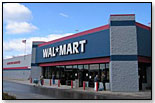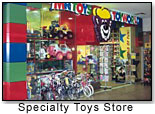
February 16, 2026


| “We have a lot of demos. ... That’s something you’ll never see at discount stores.” — Sandy Whitten, Sparks Toy and Hobby Shoppe |
 Wal-Mart is going niche. Well, sort of: In a June 2nd press release, Wal-Mart CEO Lee Scott pledged to “build more experimental stores to help the company broaden its appeal to Hispanic customers, rural customers and Baby Boomers.” And, as of January, Target began putting specialty toys into 1400 stores across the country from manufacturers such as Schleich and Breyer Animal Creations — normally the bread and butter of independent toy stores.
Wal-Mart is going niche. Well, sort of: In a June 2nd press release, Wal-Mart CEO Lee Scott pledged to “build more experimental stores to help the company broaden its appeal to Hispanic customers, rural customers and Baby Boomers.” And, as of January, Target began putting specialty toys into 1400 stores across the country from manufacturers such as Schleich and Breyer Animal Creations — normally the bread and butter of independent toy stores.
Because Wal-Mart excels in nearly every market it has tried to enter should specialty toy retailers be concerned?
Those that TDmonthly Magazine asked resoundingly replied, “No.” Here’s why (it’s worth taking notes if you’re afraid of big bad Wal-Mart one day moving in on your niche):
Sandy Whitten, owner of Sparks Toy and Hobby Shoppe in Smithfield, R.I., spat, “I hate going to Wal-Mart — it’s dirty, it’s crowded, it’s nuts. … They have a different clientele.”
She doesn’t think a Wal-Mart going niche market would ever impact her store.
“We have a lot of demos — puzzles all over the tables, kids riding on Plasma Cars — parents love it because kids can try it out first to see if they like it. That’s something you’ll never see at discount stores.”
At Henry Bear's Park in Arlington, Mass., operations manager Victor Oliveira said that Toys “R” Us recently moved out of the neighborhood, leaving his store to pick up more toy sales. However, what really draws the customers back is trust.
“It’s the things you sell them and the things you don’t,” he said. “Nine times out of 10, people walk in the door saying, ‘I need a gift.’ That’s what they want.” He helps them find that gift.
Sometimes people come into Oliveira’s store and pick something up for a child in a certain age range, which he steers them away from because it isn’t age appropriate. Other times, “we turn down carrying a hot-selling product even though we would make money off of it,” if it isn’t of quality or value, either from an educational or play standpoint. “Those things are all important. We build a relationship with [the customer].”
Laura Miller, owner of Imagination Village in Concord, N.H., seconded this notion. “We deal one-on-one with customers, so we get a lot of recommendations. We’re very flexible in being able to respond to their needs. We can do a lot of special orders.”
Also, Miller said that her store gets a lot of referrals from the local Toys “R” Us and Borders. There was a Wal-Mart and Target in the neighborhood before she opened shop, but because of loyal downtown shoppers the big stores haven’t posed a serious threat. She feels there’s roo m for both discount and locally owned specialty stores.
m for both discount and locally owned specialty stores.
Diane Robinson, president and owner of Silly Goose Inc. in Essex, Mass., explained that she’s not concerned about a new niched Wal-Mart because her store is in a small village where there isn’t room for a big box retailer within 15 minutes. But beyond location, location, location, she said it’s the classic, unlicensed, noncommercial, no-batteries-required toys that line the shelves of Silly Goose that keep customers excited about her shop.
“It’s the classic toys that parents have grown up with that they want their kids to have,” Robinson explained. “It’s quite an experience for people to walk into our store and see toys they played with as a child. They get to rediscover them.”
“We carry specialty toys,” said Jane Christopherson, owner for 31 years of Once Upon a Time Toys in Stowe, Vt., who just recently put her store on the market so that she could retire. She argued that no matter how “niche” Wal-Mart may be structuring its stores, it still won’t have the variety of small, unusual products. In addition, she’s located in a resort town where a lot of foot traffic is a result of out-of-towners looking to pass the time and locate specialty items.
Rick Henry, owner of Stellabella Toys in Cambridge, Mass., said, “We have a very diverse population — incomes, ethnicities, you name it.” Though it’s difficult to pinpoint one specific demographic, the store still manages to “reflect our community’s values well, and our customers appreciate that.”
Henry described it as “a synchronicity” between his clientele’s needs and what his store provides. For instance, he doesn’t carry toy guns or other items that some would not deem suitable for children. In addition, “the environment is calm and uncluttered. We don’t merchandise over 4.5 feet. There’s room for a baby stroller to get down the aisles and of our 3500 square foot store, about 200 square feet — about 7 percent — is devoted to classroom play.”
In this section, they have storytelling time, craft groups meet, sing-alongs, even kids’ play groups. This attitude would be difficult for Wal-Mart — or any other major discounter — to infringe upon.
Copyright © 2026 TDmonthly®, a division of TOYDIRECTORY.com®,
Inc.